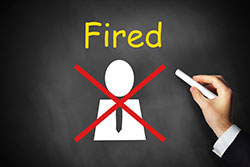
The overwhelming majority of employees are considered to be at-will employees. If an employee works without a contract stating otherwise, that person’s employment is considered at- will for its duration. This means that the person serves at-will and either party may terminate the employment at any time. Even though an explanation is not always given as to why an employee is being fired, there are still some reasons for termination that are unacceptable in the eyes of the law. It is important to be aware of these instances to avoid the appearance of improper behavior and the potential for economic repercussions as a result.
Termination is not the only action that may be actionable. Under specific circumstances, an employee is permitted to file a claim against an employer for any negative employment actions, including cutting back available hours, pay reductions, or demotions in title. Any negative employment action may give rise to a lawsuit if the employee can prove that the basis of the negative employment action is improper or discriminatory.
Federal law prohibits discrimination against employees on the basis of race, gender, national origin, disability, religion, genetic information, or age, if the employee is over the age of 40. Many states add additional protections including protection from discrimination against employees due to sexual orientation or gender identity.
Other restrictions against firing or other actions that negatively affect job status also exist. It is illegal to fire someone one, or otherwise negatively affect their employment, in retaliation for their filing of a legal claim, whether for discrimination, sexual harassment, or workers compensation. An employer also may not use a person’s ability to work as an incentive to force him or her to take a lie detector test. No individual can be legally fired for complaining about OSHA violations, for refusing to commit an illegal act, or for reporting an illegal act committed by a co-worker or employer (whistle blowing). If an employee exercises a legal right, like voting or taking family leave based on the Family Medical Leave Act, he or she cannot legally be fired for the lost time.
Terminating or otherwise negatively affecting an individual's employment because of any of the above-mentioned events is illegal. Employers should go out of their way not to fire employees contemporaneously with such events, even for other causes, since this may give the appearance of impropriety,and potentially provoke an expensive lawsuit. If you are a business owner facing such a claim or lawsuit, we can help. Call now for your complimentary initial consultation, Franz Cobos, Esq.